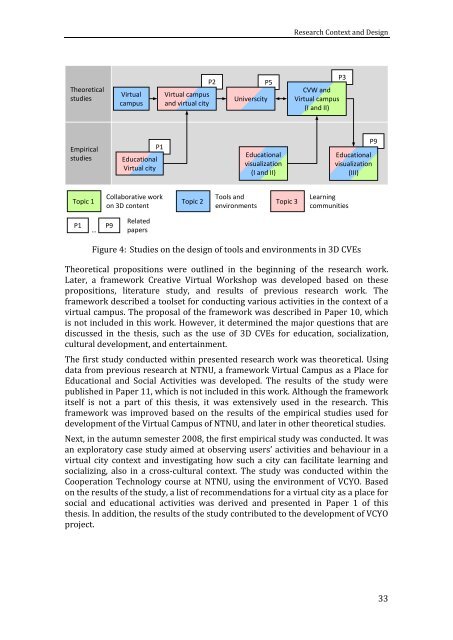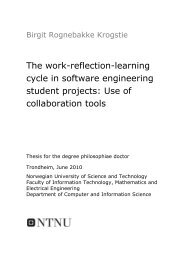Disputation Mikhail Fominykh - Department of Computer and ...
Disputation Mikhail Fominykh - Department of Computer and ...
Disputation Mikhail Fominykh - Department of Computer and ...
Create successful ePaper yourself
Turn your PDF publications into a flip-book with our unique Google optimized e-Paper software.
Research Context <strong>and</strong> Design<br />
Theoretical<br />
studies<br />
Virtual<br />
campus<br />
Virtual campus<br />
<strong>and</strong> virtual city<br />
P2<br />
Universcity<br />
P5<br />
CVW <strong>and</strong><br />
Virtual campus<br />
(I <strong>and</strong> II)<br />
P3<br />
Empirical<br />
studies<br />
Educational<br />
Virtual city<br />
P1<br />
Educational<br />
visualization<br />
(I <strong>and</strong> II)<br />
P9<br />
Educational<br />
visualization<br />
(III)<br />
Topic 1<br />
Collaborative work<br />
on 3D content<br />
Topic 2<br />
Tools <strong>and</strong><br />
environments<br />
Topic 3<br />
Learning<br />
communities<br />
P1<br />
…<br />
P9<br />
Related<br />
papers<br />
Figure 4: Studies on the design <strong>of</strong> tools <strong>and</strong> environments in 3D CVEs<br />
Theoretical propositions were outlined in the beginning <strong>of</strong> the research work.<br />
Later, a framework Creative Virtual Workshop was developed based on these<br />
propositions, literature study, <strong>and</strong> results <strong>of</strong> previous research work. The<br />
framework described a toolset for conducting various activities in the context <strong>of</strong> a<br />
virtual campus. The proposal <strong>of</strong> the framework was described in Paper 10, which<br />
is not included in this work. However, it determined the major questions that are<br />
discussed in the thesis, such as the use <strong>of</strong> 3D CVEs for education, socialization,<br />
cultural development, <strong>and</strong> entertainment.<br />
The first study conducted within presented research work was theoretical. Using<br />
data from previous research at NTNU, a framework Virtual Campus as a Place for<br />
Educational <strong>and</strong> Social Activities was developed. The results <strong>of</strong> the study were<br />
published in Paper 11, which is not included in this work. Although the framework<br />
itself is not a part <strong>of</strong> this thesis, it was extensively used in the research. This<br />
framework was improved based on the results <strong>of</strong> the empirical studies used for<br />
development <strong>of</strong> the Virtual Campus <strong>of</strong> NTNU, <strong>and</strong> later in other theoretical studies.<br />
Next, in the autumn semester 2008, the first empirical study was conducted. It was<br />
an exploratory case study aimed at observing users’ activities <strong>and</strong> behaviour in a<br />
virtual city context <strong>and</strong> investigating how such a city can facilitate learning <strong>and</strong><br />
socializing, also in a cross-cultural context. The study was conducted within the<br />
Cooperation Technology course at NTNU, using the environment <strong>of</strong> VCYO. Based<br />
on the results <strong>of</strong> the study, a list <strong>of</strong> recommendations for a virtual city as a place for<br />
social <strong>and</strong> educational activities was derived <strong>and</strong> presented in Paper 1 <strong>of</strong> this<br />
thesis. In addition, the results <strong>of</strong> the study contributed to the development <strong>of</strong> VCYO<br />
project.<br />
33
















